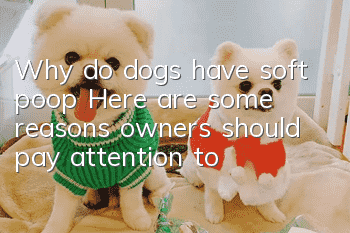Why do dogs have soft poop? Here are some reasons owners should pay attention to

Causes of soft stools in dogs: food problems
If the dog’s daily diet is too greasy, or the dog’s food is suddenly changed and causes gastrointestinal discomfort, the dog will have soft stools. For such a situation, it is best to change the food to light and low-salt natural dog food, and let the dog slowly adjust for a few days, and the situation will improve. When changing dog food, you should do it step by step. Mix the old and new dog food and feed it. The proportion of new dog food should increase from small to large, so that the dog can slowly adapt.Causes of soft stools in dogs: indigestion
Dogs eat irregularly and are prone to indigestion if they eat too much, leading to varying degrees of soft stools or loose stools, vomiting, bloating, etc. . In this regard, you can feed your dog some Wangxiang probiotics to promote digestion in the dog's gastrointestinal tract and relieve the symptoms of soft stools. It is best to change the diet to easily digestible food, such as some liquid food such as porridge.The cause of soft stool in dogs: suffering from internal parasites
Parasites in the dog’s stomach will cause the dog to have soft stool, and the stool may be jelly-like, and may also Mixed with blood or insects. To this end, you need to feed your dog an anthelmintic drug. Drugs such as German Bayer or Baichongqing are available at pet hospitals. It is recommended that dogs should be dewormed once every three months. Regular deworming will ensure the health of the dog.Causes of soft stools in dogs: catching cold
The temperature changes greatly during the change of seasons. If the dog sleeps on the cold floor, it is quite easy to have loose stools. For such a situation, you can first feed the dog some isatis root or children's cold granules to treat the cold, and pay attention to keeping warm indoors.The cause of soft stool in dogs: enteritis
Dogs can easily suffer from enteritis due to irregular diet, feeding too cold or irritating food. If you find that your dog has long-term loose stools, it is recommended to take your dog for a fecal examination. Enteritis should be treated as soon as possible to avoid making the disease worse. Random articles
- Can’t you train a Husky? Husky training tips!
- Dog hepatitis symptoms and prevention measures
- What is canine distemper? Symptoms and treatment of canine distemper in dogs!
- Things to note when raising a French bulldog
- How to euthanize a dog
- A must-read for poop scrapers, 14 symptoms of sick pets at home!
- A few pictures to help you easily determine whether your dog or cat’s weight is standard
- How to give injections to dogs? What you need to know about dog vaccinations - The pet next door
- How to supplement calcium for Rottweiler puppies?
- Symptoms of meningitis in dogs



